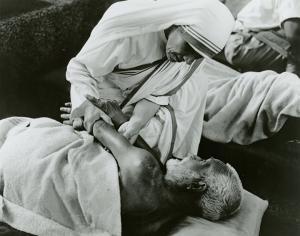In response to Christ`s call, Mother Teresa completely denied herself. She was very conscious of the poor from a young age; Jesus Christ was the center of her life, hence, her Christ centric approach to life. Mother Teresa’s hermeneutical interpretation of scripture also transformed the way she approached each suffering individual.

Mother Teresa`s Christocentric View
Personal and intimate relationship

Mother Teresa unequivocally understood Jesus through prayer and devotion. Her intimate relationship with Christ made her see His human dimension in the poor.
The humble Jesus portrayed in the Gospels inspired Mother Teresa to imitate Him; her life was a living prayer. Mother Teresa often preached that one could clearly hear God in silence; therefore, she would isolate herself and be alone in the presence of God – “the essential thing is not what we say but what God says to us and through us (Pg. 48).”
Mother Teresa stressed the following prayer, “it is not possible to engage in the direct apostolate without being a soul of prayer. We must be aware of oneness with Christ, as he was aware of oneness with his Father. Our activity is truly apostolic only in so far as we permit him to work in us and through us, with his power, with his desire, with his love” (pg. 47). Like Jesus, Mother Teresa opted for servanthood. According to her, to serve is to embrace and follow Christ the servant. Jesus`s words in Lk 22:27, encouraged her to be the servant she had become. She often preached that people are not called to be successful, but to be faithful.
Sacrament

Mother Teresa was very particular about attending Mass in the mornings. Her mystic love made her see Jesus and the poor through the Eucharist. In addition to the common vows of poverty, chastity, and obedience professed by most religious orders in the Catholic Church, the Missionaries of Charity profess a fourth vow, which is about being freely and wholeheartedly of service to the poorest of the poor, this as a way to emphasize the love towards Jesus in His distress. Mother Teresa taught the Missionaries of Charity that their utmost service to the poor, it is Christ touching the broken bodies of the hungry and impoverished through them.
“For I was hungry and you gave me food, I was thirsty and you gave me drink, a stranger and you welcomed me, naked and you clothed me, ill and you cared for me, in prison and you visited me.” (Matt 25:35-36)
To Mother Teresa, the broken Eucharist at the altar represented the broken bodies of the poor people in the streets.
Instrumentality

Mother Teresa`s favorite verse was Paul’s declaration in Gal 2:20, “Yet I live, no longer I, but Christ in me”
She often said that she is not important, the work that she does is the work of the Lord and that it should remain that way; each person is simply an instrument in the Lord`s hand – we complete our mission on this earth and we later pass on.
In a very spiritual way, Mother Teresa detached herself from the material world and submitted herself to the will of God. She stated that, “we must become holy, not because we want to feel holy, but because, Christ must be able to live his life fully in us”. She also taught the Missionaries of Charity Sisters that whatever work they did in devotion to Christ should not be out of pride.
Mother Teresa never gave much attention to the donations that arrived at the centers of the Missionaries of Charity, her main concern were the destitute people on the streets, who were the main concern of Missionaries of Charity Sisters. Mark 12: 43-44 is one of the bible verses that Mother Teresa felt that it spoke directly to them as an order taking care of destitute people-
“Calling His disciples to Himself, He said to them, “Amen, I say to you, this poor widow put in more than all the other contributors to the treasury. For they have all contributed from their surplus wealth, but she, from her poverty, has contributed all she had, her whole livelihood.”
Individual experience of the destitute

The injustices the poor faced greatly troubled Mother Teresa; it is for this reason that the first center that she established was dying people. She wanted to assist such people to die in peace and dignity. Mother Teresa wanted each homeless person to experience divine and human love during their last hours on earth, so that they can realize that they too are God`s children who are loved and deserve to be cared for like the man Jesus talks about in the parable of the Good Samaritan (Lk 10: 29-37),
“But because he wished to justify himself, he said to Jesus, “And who is my neighbor?” Jesus replied, “A man fell victim to robbers as he went down from Jerusalem to Jericho. They stripped and beat him and went off leaving him half-dead. A priest happened to be going down that road, but when he saw him, he passed by on the opposite side. Likewise, a Levite came to the place, and when he saw him, he passed by on the opposite side. But a Samaritan traveler who came upon him was moved with compassion at the sight. He approached the victim, poured oil and wine over his wounds and bandaged them. Then he lifted him up on his own animal, took him to an inn and cared for him. The next day he took out two silver coins and gave them to the innkeeper with the instruction, ‘Take care of him. If you spend more than what I have given you, I shall repay you on my way back’ Which of these three, in your opinion, was neighbor to the robbers’ victim?” He answered, “The one who treated him with mercy.” Jesus said to him, “Go and do likewise.”
In conclusion, Mother Teresa`s spirituality was Christocentric – her life centered on Christ and she expressed it in action through devotion and prayer. She stayed compassionate, patient, and humble through the criticisms, temptations, and trials. Her primary concern was for the poor to be treated with dignity. Mother Teresa`s faith in Christ was instrumental in her efforts to make the world a better place.













